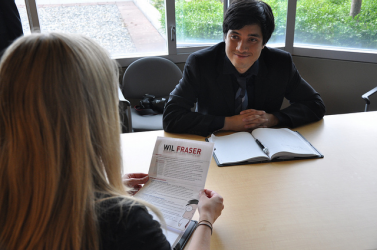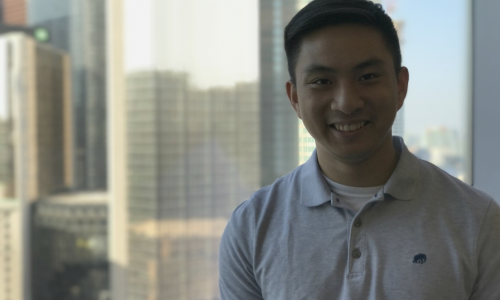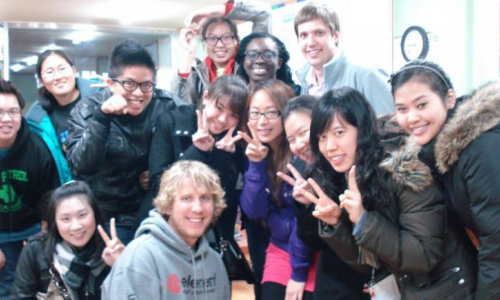
Myth
Job interviews are NOT a breeze as they are a test for employers to find out if you are the right fit for the job and for the company/organization that you want to work for. Think of it as a Q&A period for the interviewer to find out more about yourself as they dig in deeper to find out about your personality, work/academic performance, and most importantly, the skills that you can bring into the job while standing out as a worthy candidate above others.
Fact
You CAN prepare for a job interview through practice, practice, practice. It sounds cliché but it is something to consider as many people usually skip this part. Although the interviewer is looking for a “stand-out” candidate with a wide range of skills or the initiative and motivation to work their job, there’s one other thing that many interviewees forget to reflect in person and WILL enhance their interview performance: acting confident!
Confidence is the most important quality that interviewers are looking for in a candidate as it is the first impression that they will take notice by the time you introduce yourself. Confidence not only makes you look smarter and happier but it will show others of what a wonderful person you are, but most importantly, that you are willing to accomplish a well performed interview with grace and enthusiasm. Confidence breeds confidence so the more you’re sure of yourself, the more it’ll show through as the interviewer will realize how much positive energy you have brought to your overall performance.
1. Research
Research the company/organization. It sounds obvious but the more work you put into this, the more you learn about the employer AND tackling the first and most common question asked in an interview: “how did you find out about us?” or “what do you know about us?” After successfully answering this question, you’ll suddenly feel relived that you’ve achieved the first step in a job interview: proving your interviewer that you’ve taken the initiative to learn something about them.
2. Making a Good Impression
On the big day when your interviewer walks towards you to shake your hand and introduce themselves, make sure you stand up straight (remember what your mother said about slouching), give them a firm (but not too firm) handshake, and don’t forget to SMILE! Nothing says a bad impression then giving a limp handshake and mumbling “hi” or else they’ll think that you’re not too happy to see them. It all goes back to what I mentioned earlier: first impressions always count in an interview. That being said, remember to dress UP (not down) by wearing a suit jacket, dress pants, and dress shoes (or comfortable heels for the ladies), but NEVER EVER runners or flip flops.
3. Being Mindful and Self-Aware
During the interview, always smile as opposed to looking tired or miserable. And always make eye contact to your interviewer as they are the person you are speaking to. One thing that not many people are aware of is keeping track of your hand movements; that is, don’t wave around your hands too much or else you end up looking awkward and “unprofessional” in the eyes of your interviewer. It’s difficult to pay attention to this as many people (like me) are self conscious as to what we do with our hands. So your best bet is to keep your hands together at all times. Speaking of self awareness, there’s also the problem with “gap” words or the annoying “ums” and uhs” that we keep saying when we loose track of our thoughts or can’t think of an answer quickly enough. In my experience, I find it impossible to escape that habit so I try to limit myself with those “gap” words and take at least a minute (but never more or else you end up with that awkward silence) to answer the question. Usually your interviewer will say beforehand that you can come back to a question latter so make sure you take advantage of that, but use their advice sparingly; that is, use it for 1 or 2 of their questions. The least thing you want is ending up completing half of your interview. I also find it helpful to take breaths after each reply as it helps me feel self assured and relaxed.
4. Take Your Time
Speak slowly when answering the questions because of two reasons: one it helps your interviewer as they write down your answers, and two it sounds better than speaking in a fast forward pace where you end up sounding nervous and jerky. Although there’s tension going on inside, speaking slowly sounds more calm and serene. That being said, if you’re one of those people who have practiced for hours beforehand and memorized every possible answer, the least thing you want to sound in an interview is a robot or someone who blurts out their answers. Always consider your words and “think before you speak” in an interview to sound more confident and poise because nothing sounds like “I-am-too-nervous!” than speaking fast paced.
5. Finish Strong
After the job interview is finished, make sure to shake your interviewer’s hand one last time before saying goodbye as you want to end your meeting with them in a flourish. And don’t forget to ask for their business cards so you can send them a short thank you note for their time and the opportunity to meet each other in person. After this, you’ll be able to walk out that door feeling more confident and relived that you’ve conquered your worst fear in tackling a job interview. Although there’s still that nerve wrecking feeling of whether you’ve got the job or not, at least you’ll know how to face future job interviews with grace and confidence.
Beyond the Blog
-
Check out the Interview Question Database to prepare for your upcoming interview!













